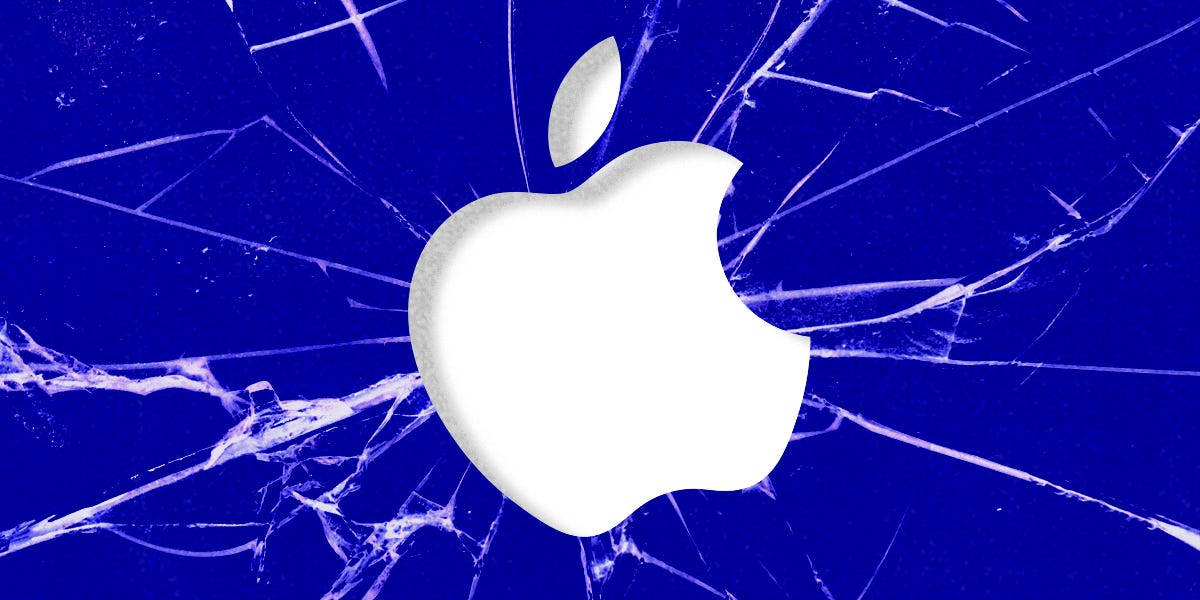The Justice Department hit Apple with a sweeping lawsuit on Thursday, accusing it of “delaying, degrading, or outright blocking” competitors in the smartphone market.
It’s the latest punch the DOJ has thrown in its long fight against Big Tech and the tactics those companies use to compete. The new suit against Apple is broad in scope and argues that the company uses rules, restrictions, and recurring behaviors to maintain a “smartphone monopoly.”
Apple denied those accusations.
“This lawsuit threatens who we are and the principles that set Apple products apart in fiercely competitive markets,” the company told Business Insider in a statement on Thursday. “If successful, it would hinder our ability to create the kind of technology people expect from Apple — where hardware, software, and services intersect.”
Here are a few ways the DOJ and others argue that Apple maintains a tight hold over the iPhone ecosystem — and keeps competitors out.
The App Store and super apps
Apple has long used its digital storefront as a moat for keeping out apps not specifically designed for the iPhone. The suit argues that Apple sets conditions for the apps it allows on the App Store and imposes anti-competitive rules and regulations.
Apple was forced to allow third-party stores on its operating system in the EU in compliance with the Digital Markets Act, which was signed by the European Parliament in 2022.
“Apple often enforces its App Store rules arbitrarily,” the suit argues, “and it frequently uses App Store rules and restrictions to penalize and restrict developers that take advantage of technologies that threaten to disrupt, disintermediate, compete with, or erode Apple’s monopoly power.”
The suit also argues that Apple suppresses super apps that provide multiple services or functions to ensure users stay hooked on the iPhone.
Cloud streaming game apps
Cloud streaming game apps allow users to play video games in the cloud instead of on a gaming console. Think of them like Netflix or Hulu for video games, where users can stream multiple intensive games in one app.
The DOJ argues that cloud streaming games can “improve smartphone competition” by making it easier to accomplish “high-compute” tasks on a smartphone. But Apple suppresses these games to keep users more reliant on its expensive hardware systems.
Creating a ‘loyal’ consumer base
It’s no secret that Apple has built a strong — and sticky — consumer base.
Research from Bank of America found that customer loyalty for Apple has remained strong over the years, with 57% of current iPhone users saying they plan to buy an iPhone during its next upgrade.
Meanwhile, according to BofA’s research, only 55% of Samsung users, 43% of Huawei users, and 33% of Xiaomi users said the same. This is corroborated by 2021 data from research firm Consumer Intelligence Research Partners, which found that Apple had maintained a loyalty rate of more than 90% in the prior three years.
But some argue that this isn’t just because the company has been churning out great products. “Much of it is due to the restrictive ecosystem that Apple has created around its products,” Andy Liu, a former student at Simon Fraser University, argued in a paper published in 2022.
That ecosystem means that the costs of switching over to other operating systems are too high for most users, and prevent them from accessing content, like music or apps, that are exclusive to Apple, Liu wrote.
Messaging apps
Thanks to Apple, no one wants to be the black sheep that responds to all their iPhone-using friends with a green bubble. The suit argues that Apple makes third-party messaging apps on the iPhone “worse” than Apple messages. In doing so, “Apple is knowingly and deliberately degrading quality, privacy, and security for its users and others who do not have iPhones.”
Smartwatches
Apple has left wearable enthusiasts in a bit of a conundrum. The company says its popular Apple Watches only work when paired with iPhones, and it won’t build a version for Androids due to technical limitations. And if you’re an iPhone user who wants to wear a Google Pixel Watch or Samsung Galaxy Watch — good luck. Apple doesn’t plan to make competing watches work with iPhones.
The DOJ argues that Apple limits smartwatch options for consumers by denying them “access to high performing smartwatches with preferred styling, better user interfaces and services, or better batteries,” which harms other smartwatch companies by “decreasing their ability to innovate and sell products.”
Digital Wallets
It’s becoming more common for iPhone users to pay for items with Apple Pay, the company’s digital wallet system. But Apple has blocked other developers from creating digital wallets on the iPhone with the same “tap-to-pay functionality,” according to the suit. Additionally, Apple also charges banks a 0.15% fee on any transaction made through Apple Pay.
The suit argues that Apple essentially “maintains complete control over how users make tap-to-pay payments with their iPhone” and “deprives users of the benefits and innovations of third-party wallets.”




